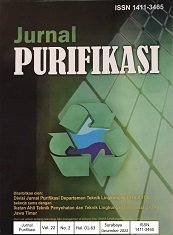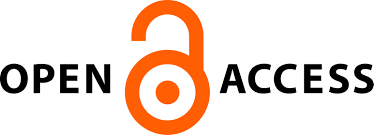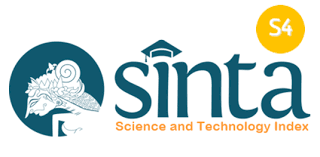FITOTREATMENT SEBAGAI POLISHING TREATMENT AIR LIMBAH SEKTOR PERIKANAN DI PASAR TRADISIONAL DENGAN MENGGUNAKAN SALVINIA MOLESTA DAN PISTIA STRATIOTES
Main Article Content
Abstract
Fisheries activities produce wastewater with high levels of BOD, COD, and TSS that are dangerous if discharged directly into the river. One of the treatments that can be done is by using phytotreatment or processing using plants. The plants used in this study are Salvinia molesta and Pistia stratiotes. The stages of this research are propagation, acclimatization, range finding test, and phytotreatment test stage. The fisheries sector wastewater used in this study came from UPT Pasar Gresik with a pH of 6.54, BOD 310 mg/L, COD 853.3 mg/L, TSS 590 mg/L and UPT Pasar Giri wastewater with a pH of 6.48, BOD 292 mg/L, COD 746.6 mg/L, TSS 440 mg/L. Based on the RFT test, Pistia stratiotes is able to survive at a concentration of 20% for Gresik Market wastewater and 40% for Giri Market wastewater while Salvinia molesta can survive at a concentration of 10% for Gresik Market wastewater and 10% for Giri Market wastewater. From the phytotreatment test, the results obtained for the removal of BOD, COD, and TSS parameters in Giri Market wastewater, Pistia stratiotes plants are more effective in reducing BOD levels by 84.6% and COD 80.6% while for TSS levels Salvinia molesta plants are more effective with a removal of 89.8%. Then for the removal of BOD, COD, and TSS parameters in Gresik Market wastewater, Pistia stratiotes plants are more effective in reducing BOD levels by 92.4% and COD 84.4% while for TSS levels Salvinia molesta plants are more effective with a removal of 90.9%.
Downloads
Article Details
Submission of a manuscript to Jurnal Purifikasi means that the work has never been published in another journal and is not under consideration for publication elsewhere. The author hereby agrees to submit the copyright of the manuscript and its contents to Jurnal Purifikasi, if accepted for publication. Accepted manuscripts will be published in printed form where the ISSN is bound in printed form, not in online form (pdf). Authors are not allowed to publish their work in other forms (journals) without permission from the Jurnal Purifikasi manager.
By submitting a manuscript, the author is deemed to know all the rights and obligations attached to each manuscript.








